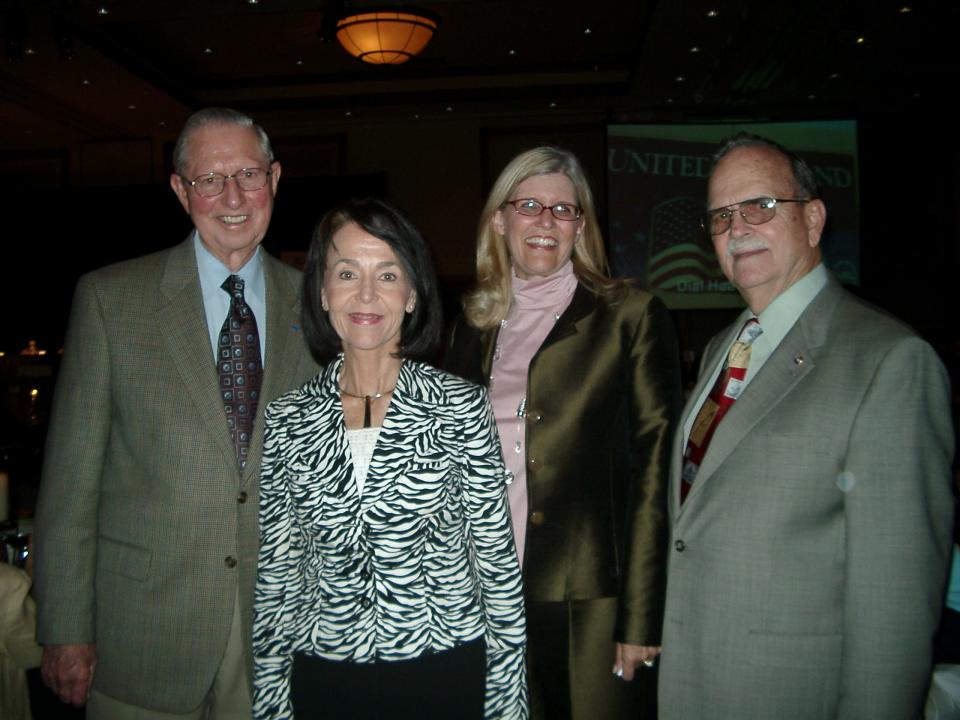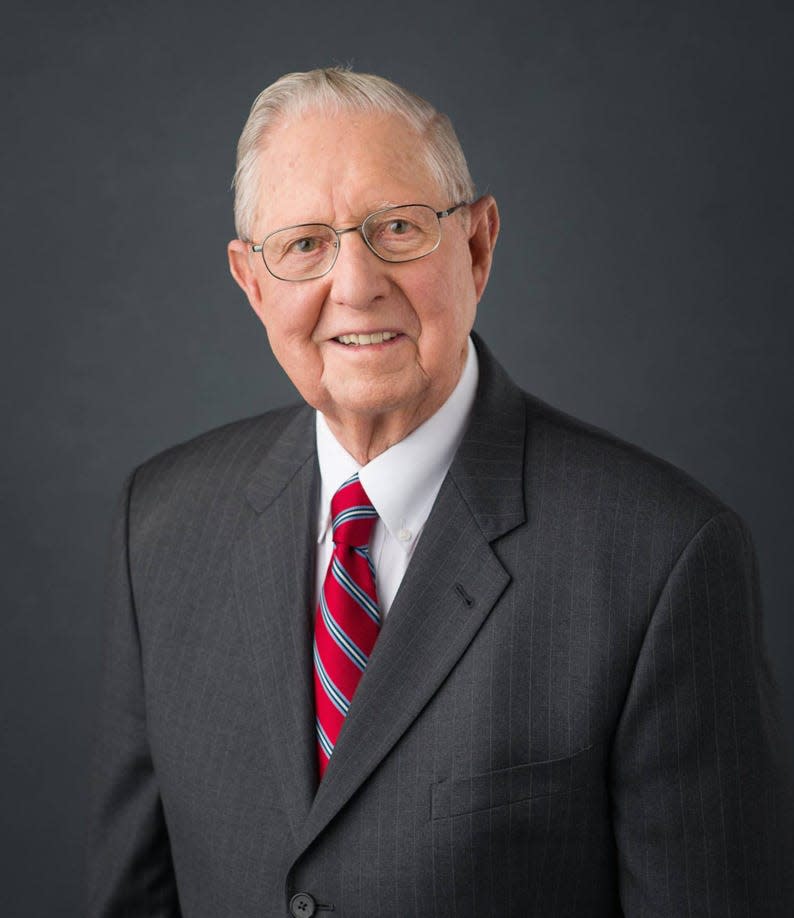Bill Schrader, who helped transform Scottsdale from a 'small little town', dies at 93
Bill Schrader, who went from herding cows as a kid in south Phoenix to helping to shape much of the Valley’s recreational, political and economic landscape, died May 18 at age 93. His career, which ranged from mayor of Scottsdale to president of water and power utility Salt River Project, coincided with the transition of the Valley from a largely agricultural region to one of the nation’s largest metro areas.
Schrader played a pivotal role not only in continuing Salt River Project’s growth but also in expanding Scottsdale’s boundaries and helping to create recreational facilities from Arizona Falls to the expansive Scottsdale greenbelt along Indian Bend Wash. He served on numerous civic and philanthropic groups, often in leadership roles, including Scottsdale’s Parada del Sol festival board, the Phoenix Zoo and the Greater Phoenix Economic Council.
William Perry Schrader was born at Good Samaritan Hospital in Phoenix on Aug. 20, 1929, at a time when Arizona counted just a bit more than 400,000 residents. Parents William Lawrence Philip Schrader and Lolah Savanah Hurt were in the dairy business and lived in South Phoenix near 27th Avenue and Baseline Road. In 1941, his parents moved the dairy to Scottsdale on 100 acres at the corner of Hayden and Indian School roads. He recalled the trek in a video recounting some of his life’s highlights.
Because the Salt River was flowing there at the time, Schrader and his family’s herd crossed over by bridge.
“We drove all of our cattle right down the middle of Tempe ... cows was walking on the sidewalk,” he said.
“People didn’t think anything of it,” he said. “They just followed all of us across the bridge.”
Schrader attended and graduated from Scottsdale High School, class of 1948, and studied agribusiness at Arizona State College (now Arizona State University). He also served in the Arizona Army National Guard, where his hearing was damaged from firing cannons, said his son, William Schrader Jr., in a eulogy.
At age 21, he married his high school sweetheart, Alfreda Bondena Stevenson, and they eventually had four children — three sons and a daughter.
A key player in Scottsdale's expansion
While working at the dairy, Schrader became active in Scottsdale politics. He was elected to the City Council in 1958 and then mayor in 1962. Soon came one of the most momentous decisions in the city’s history.
Tipped off that Phoenix was considering a land grab that could have hemmed in Scottsdale to the north, Schrader oversaw a response that dramatically expanded the city’s acreage. Phoenix was considering the annexation of Thunderbird Field, which started as a military training field on the current site of Scottsdale Airport.
If successful, Phoenix might have annexed land all the way to the McDowell Mountains to the northeast, recounted businessman Paul Messinger, who served on the Scottsdale City Council and later in the state Legislature and was a friend of Schrader’s dating to childhood.
Schrader went home after receiving the tip, milked his cows and called a meeting of key city officials for the following day. They devised a proposal to annex DC Ranch, a cattle expanse in an unincorporated area. The owners agreed, and in 1963, Scottsdale added 34 square miles, expanding its borders to Carefree Highway, establishing Scottsdale Road as part of the boundary with Phoenix and securing what became Scottsdale Airport.
“Scottsdale used to be a small little town, but now Scottsdale is a huge town, and I’m very proud of that,” Schrader later said in the video tribute, which was produced by Salt River Project board member Keith Woods.
Schrader also was instrumental in establishing Scottsdale’s Indian Bend Wash Greenbelt — a stretch of parks, ponds and golf courses — in a flood zone. “That’s what we did, and now it’s probably one of the most useful (recreation) parts of the state,” Schrader said.
The alternative could have been a concrete channel, Woods said.
But Schrader didn’t stay mayor for long, giving up the post to spend more time with family and continue with the dairy business, when his days sometimes would start at 4 a.m. milking cows. Back then, disgruntled Scottsdale residents could and sometimes did look him up in the phone book and call him at home.
Schrader's son William Jr. said his father’s work ethic was shaped by his farming background and “remained a trademark throughout his life.”

Guiding utility during a difficult stretch
After resigning as Scottsdale's mayor, Schrader became more active with Salt River Project. He started as a board member in 1964, was elected vice president in 1990 and became president in 1994, serving in that capacity for the next 12 years and overseeing the expansion of the Kyrene and Santan generating stations, purchase of the Desert Basin Generating Station and adding to the infrastructure at Theodore Roosevelt Dam.
“He served three eventful terms as president at SRP, earning the organization recognition for accomplishments in water management through a record drought, in outstanding customer service and in volunteerism and community service,” said current President David Rousseau. “Bill also advanced SRP’s unwavering commitment to safety and safe working conditions.”
Schrader’s tenure as president came at a critical time after the utility endured three rounds of layoffs that cut the staff by more than 20%, recalled Mark Bonsall, a senior executive who later became Salt River Project’s general manager. The cuts followed years of overstaffing and overbuilding and left a “dispirited and demotivated group of employees.”
But Schrader connected with employees “handshake by handshake, meeting by meeting, visit by visit, story by story and eyeball by eyeball,” Bonsall said. “Over time, the cynicism and wariness gave way.”
Schrader also guided the utility through a treacherous stretch of deregulation with a focus on controlling costs, providing high-quality service and expanding community engagement, Bonsall added.
Woods said he feels Schrader made Salt River Project a more family-friendly place for employees. For example, under Schrader, managers, board members or others who traveled for work to conferences or meetings were allowed to bring their spouses and kids along, provided they paid for them separately. Previously, that wasn’t allowed, said Woods, who has been affiliated with the utility for 27 years.
Schrader also was a “straight shooter,” Woods added. “If he didn’t like you, he would tell you; but if he respected you, you knew it.”
Varied philanthropic and other interests
Schrader also was involved with various community groups including the boards of the Phoenix Zoo, Greater Phoenix Economic Council, Maricopa Community Colleges, Scottsdale Rodeo, Scottsdale Jaycees and Scottsdale Charros philanthropic group. While at Salt River Project, he helped establish the Arizona Falls canal park and hydroelectric plant near Indian School Road and 56th Street, which opened in 2003.
“Bill Schrader was the most generous volunteer I’ve ever known, with his resources and with his time,” said Terrill Lonon, Salt River Project’s former corporate secretary. “That’s something he grew up with: giving and recognizing what people need and helping them.”
He received on behalf of Salt River Project a Points of Light Foundation award from President George H.W. Bush, recognizing the company's community service. The two conversed over a gin martini each. That wasn’t Schrader’s favorite drink, his son William Jr. recalled, “but it was that day.”

Schrader was an avid golfer, elk hunter and fisherman who took frequent trips to the area around Cholla Bay, Mexico, and vacations in the White Mountains, where he was a member of the local country club and especially enjoyed the forest during monsoon rains.
The family farm later relocated to Gilbert and eventually to Chandler. In the process, dairy cows were replaced by cotton and alfalfa. One farm foreman, William Turner, worked for the family for more than 60 years, William Jr. said.
Schrader was preceded in death by his son Larry, daughter Alisa and his wife Bondena, to whom he was married for 53 years. He is survived by his sons William Jr. and Travis, 12 grandchildren and four great-grandchildren, along with longtime companion Anna Mae Fritz.
A funeral service was held June 3 at Scottsdale United Methodist Church. In lieu of flowers, the family has requested donations to Scottsdale Charros.
Reach the writer at russ.wiles@arizonarepublic.com.
This article originally appeared on Arizona Republic: Bill Schrader, former SRP president and Scottsdale mayor, dies at 93

